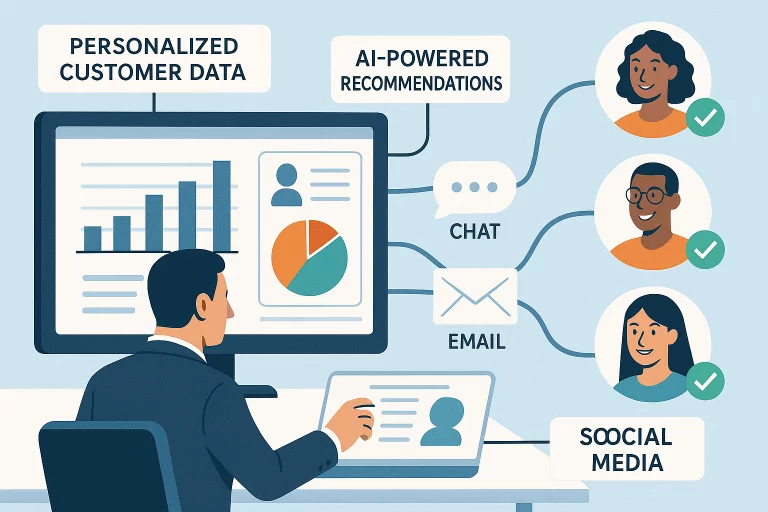Key Takeaways:
- Digital transformation enables personalized customer experiences through data analytics and AI.
- Omnichannel strategies ensure seamless interactions across various platforms.
- AI-powered tools like chatbots and predictive analytics improve customer support and satisfaction.
- Social media platforms are crucial in modern Customer Relationship Management (CRM).
- Implementing digital tools requires strategic planning and continuous adaptation to evolving technologies.
As the digital landscape evolves at breakneck speed, businesses are finding themselves at the forefront of an unprecedented transformation in customer engagement. Advanced technologies, from cloud platforms to artificial intelligence, have streamlined internal processes and facilitated stronger, more personalized connections with clients. Leveraging Salesforce consulting services allows organizations to maximize the potential of digital tools, tailor experiences, and secure meaningful engagement at every step of the customer journey.
These technological advancements have set new, higher standards for customer expectations and forced organizations to rethink long-standing strategies. Integrating robust platforms and agile solutions ensures that every customer touchpoint—whether a social media message, phone call, or email—delivers efficiency and real, tangible value. Adapting swiftly in this dynamic, hyper-connected world is essential for any business hoping to thrive and outpace competitors.
Personalized Customer Experiences
Data-Driven Personalization
Modern consumers expect brands to understand their preferences and needs, leading to the use of AI, advanced data analytics, and machine learning in various industries. These capabilities enable brands to build personalized customer profiles, deliver tailored experiences, and adjust offers instantly, thereby driving higher engagement rates and delighting users.
Impact on Customer Loyalty
Personalization is the foundation upon which strong and enduring customer relationships are built. When customers feel truly seen and understood, their connection to a brand deepens, increasing the likelihood of repeat purchases and positive word-of-mouth. Numerous studies confirm that tailored experiences engender higher satisfaction, greater retention, and stronger brand advocacy. With increasingly sophisticated segmentation capabilities, businesses can create marketing campaigns that resonate deeply, foster trust, and encourage brand loyalty that translates into tangible, long-term business value.

Companies that demonstrate a genuine understanding of their clients can differentiate themselves in crowded markets. Beyond a mere transaction, the sense of being recognized encourages customers to stay loyal and even promote the brand to others, often via their own social media networks or online reviews, amplifying the business’s reach organically.
Omnichannel Engagement
Digital transformation enables omnichannel strategies to manage multiple touchpoints, ensuring seamless and consistent interactions. This approach enhances customer experience by providing convenience, continuity, and a sense of care. Real-time interactions, powered by digital tools, empower customer service agents to provide personalized support and answers. This interconnected data ecosystem reduces response times, fostering empathy and effectiveness. This proactive approach helps brands foster deeper relationships by resolving issues before they escalate, demonstrating a commitment to continuous improvement.
AI-Powered Customer Support
Automation for Efficiency
The dawn of AI-driven technologies has dramatically reshaped customer support. Automated tools such as chatbots, virtual agents, and smart ticketing systems effortlessly manage large volumes of routine inquiries, offering round-the-clock assistance. These solutions can answer frequently asked questions, process returns, and provide status updates without involving a live agent.
While automation covers the basics, complex customer issues still benefit from human expertise. By freeing human agents from repetitive work, AI enables teams to dedicate more energy and resources to nuanced concerns requiring critical thinking, creativity, or empathy. This hybrid approach ensures that every inquiry gets the right level of attention, making support experiences efficient and personable.
Enhanced Customer Satisfaction
Integrating AI-driven tools into customer service reduces costs, shortens wait times, and raises the bar for customer satisfaction. Based on historical behavior and real-time data, predictive analytics empower teams to anticipate needs, proactively reach out, and deliver solutions before a minor issue becomes a major problem. As a result, customers enjoy smoother experiences and fewer frustrations, while businesses benefit from fewer escalations and more positive feedback.
Social Media’s Role in CRM
Social media platforms like Facebook, LinkedIn, Twitter, and Instagram are crucial for customer relationship touchpoints, allowing organizations to address inquiries, respond to complaints, and collect feedback. This visibility fosters accountability and allows businesses to gather insights on customer sentiment. Positive social engagement also builds advocacy and community, with customers becoming vocal brand advocates and co-creators of the brand’s reputation and voice.
Implementing Digital Tools Strategically
Digital transformation requires a strategic assessment of business needs and customer journeys, identifying gaps and bottlenecks. Tool selection should align with objectives and customer expectations, aiming for intuitive, scalable platforms. Employee readiness is crucial, with comprehensive training programs and ongoing professional development. Continuous monitoring and adaptability are essential for sustainable success, tracking metrics like resolution time, satisfaction scores, and channel engagement. This iterative approach ensures alignment between technology investments and business goals, allowing brands to remain responsive to market changes.
Conclusion
Digital tools have truly redefined how businesses connect with customers, breaking down barriers, personalizing journeys, and transforming mere transactions into memorable relationships. By embracing personalization, omnichannel strategies, automation, and engaged social media outreach, organizations are better positioned for the long term.
Read More : The Fascinating Phenomenon of Liisbettsis Runnak

